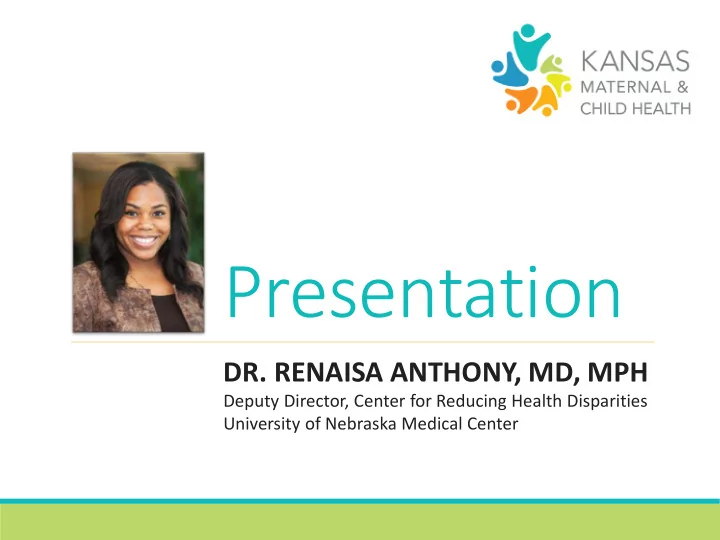

Presentation DR. RENAISA ANTHONY, MD, MPH Deputy Director, Center for Reducing Health Disparities University of Nebraska Medical Center
Adverse Childhood Experiences (ACE Scores) Theory, Application & Implementation Renaisa S. Anthony MD, MPH Deputy Director/Assistant Professor Center for Reducing Health Disparities College of Public Health (402) 559-9660 January 11, 2017
I Am: • Licensed practicing physician by training • Public health practitioner by passion • Deputy Director of the CRHD • Founding MCH Faculty • Professor/Faculty Member UNMC • Honored to be here with you! • Caring for women & patients for 10+ years • Doctor/patient relationship (backstage pass)
Who Are You? Where do you make an impact? • Health Care Professionals (direct service) • Public Health Practitioners • Health Departments • Other Government/Policy Organizations • Other Non-Profit Organizations • Academic/Researchers • Administrators • Kansas (urban, rural, other) Who is passionate about women, children and adolescents? MCH?
Pop Quiz: What is?
Social Determinants MODIFIABLE • Zip Code/Neighborhood • Educational attainment • Employment status • Socioeconomic status Where you live, work, play and pray makes a tremendous • Social environment impact on health and long term • Resources life outcomes. NON MODIFIABLE • gender, race, ethnicity and age OTHERS (may or may not be modifiable) • culture, religion individual but also societal level
Also what you experienced before the age of 18…makes a significant impact Unfortunately, children DO NOT Start at the same Start Line
Adverse Childhood Experiences • Chronic, toxic stress and childhood trauma impact the development of children into adolescence and across the life course.
The Ace Study
http://www.npr.org/sections/health-shots/2015/03/02/387007941/take-the-ace-quiz-and- learn-what-it-does-and-doesnt-mean
THE DATA
The ACE Pyramid: Theoretical Framework
Childhood Experiences Underlie Chronic Depression 80 History of Depression 70 % With a Lifetime 60 50 40 Women 30 Men 20 10 0 0 1 2 3 >=4 ACE Scores
ACE Score vs. Unintended Pregnancy or Elective Abortion 80 Unintended Pregnancy % have Unintended PG, or AB 70 Elective Abortion 60 50 40 30 20 10 0 0 1 2 3 4 or more ACE Score
Childhood Experiences Underlie Later Suicide 25 20 % Attempting Suicide 15 10 5 0 0 1 2 3 >=4 ACE Score
What happens to these children? What determines their outcomes?
What happens to these children? What determines their outcomes?
Influences Over the Life Course Risk vs. Protective Factors: Drinking alcohol Smoking tobacco Sexual promiscuity Using drugs Overeating/eating disorders Delinquent behavior Poor Impulse Control Self inflicted harm (self injury) Relationship Trauma and more….. 34 From Neal Halfon
40 Developmental Assets
40 Developmental Assets
Resilience
Positive Deviance Adverse Childhood Experiences, 40 Developmental Assets, Resilience, Coping. Protective Factors Can Mitigate ACEs • What is wrong is always available but so is what is right! • In every community there are individuals or groups whose uncommon behaviors and strategies enable them to find better solutions to problems than their peers, while having access to the same resources.
HOW CAN YOU APPLY THIS FOR YOUR POPULATION & KEY STAKEHOLDERS
Prevention & Lifecourse Model
How I Use: (RECIPE)
Trauma Informed Care http://www.traumainformedcareproject.org/
Reproductive Life Planning! http://www.cdc.gov/preconception/reproductiveplan.html
FP: Contraception
Bedsider.org
Policy/Advocacy
Preconception & Interconception http://www.cdc.gov/preconception/index.html
Centering Pregnancy
Unnatural Causes: When the Bough Breaks
Poverty Simulator playspent.org
Bridges Out of Poverty
Collaboration: Academic Partners
Socio-ecological model (SEM)
Other
https://www.youtube.com/watch?v=yQrBCJpTewc
So What Will You Do? How can & will you use this?
Just maybe?
Renaisa S. Anthony MD, MPH University of Nebraska Medical Center Center for Reducing Health Disparities College of Public Health Renaisa.anthony@unmc.edu 402 559-9660
Recommend
More recommend